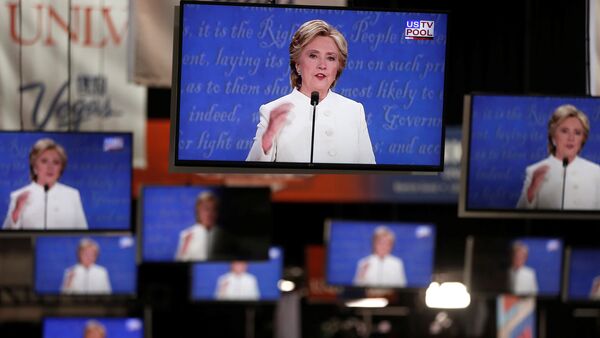Americans reacted to Donald Trump’s victory with various feelings ranging from anger and denial to joy and satisfaction. While the supporters of the newly elected US president were celebrating, Hillary Clinton’s fans were left coping with her loss.
I am in shock, but the American people have spoken
— Michael McFaul (@McFaul) 9 ноября 2016 г.
Imagine that the US presidential election is a computer game. Collecting all the keys to get into the Whitehouse means the players have to go searching for them in several important locations – these are known as the "swing states."
While the outcomes in most US states are more or less predictable from one election cycle to another, in swing, or “battleground” states voters often change their typical preference.
According to Politico, the most up-to-date list of these states includes Colorado, Florida, Iowa, Michigan, Nevada, New Hampshire, North Carolina, Ohio, Pennsylvania, Virginia and Wisconsin.
So when Trump claimed victory in five of them, most people in Camp Hillary knew it meant trouble.
The democrats were pushing hard for a victory in North Carolina, but apparently even a midnight rally with John Bon Jovi performing “Living on a prayer” and Lady Gaga impersonating Michael Jackson wasn't enough to convince the locals to vote for Hillary.
Trump fought fiercely for Ohio. Just like any other Republican candidate he had to secure victory in “the Buckeye state” on his path to the Oval office, and he did.
Trump won Ohio by same margin as Texas.
— Ryan Heath (@PoliticoRyan) 9 ноября 2016 г.
Wow.#Election2016
It was a tough victory for the Republican candidate. Under the US electoral college system, the president is not directly chosen by voters, so Donald Trump had to win 270 out of 578 electoral votes to secure his victory. He eventually received them, largely due to winning in “battleground states.”
Each state has a different number of electors depending on the number of eligible voters. Almost every state chooses to allocate all its Electoral College votes to the candidate who won locally, with no regard to the margin of their victory.
Throughout its history, this system has received plenty of criticism for being unfair and for not reflecting the views of actual voters. But despite its imperfections, on November 8, 2016, the US Electoral College seems to have performed just fine when it comes to preventing any significant voter fraud – a problem that was one of the main concerns for many Americans in the run-up to the election.
Andrew Gumbel, an award-winning journalist and author of the book “Down for the Count: Dirty Elections and the Rotten History of Democracy in America” told Sputnik that "there is really zero evidence" of vote stealing taking place on any meaningful scale. But according to Gumbel, the US electoral system in general still has other flaws.
"The United States does have a lot of pervasive problems with its electoral system. The very fact that partisans in states can pass laws that block certain groups of voters from being able to express themselves fairly is in and of itself an anomaly. Most advanced Western democracies have some kind of central electoral commission that lays down standards, sets rules and doesn't make it possible for political parties to interfere in this way. The United States is different."
Unlike the electoral votes of both candidates, which differ significantly, the actual numbers of voters behind each of Clinton and Trump are very close, making post-election USA a deeply divided country. And even though Donald Trump is likely to have the support of the predominantly Republican Congress and Senate, winning the trust of the entire nation may become his biggest challenge yet.


